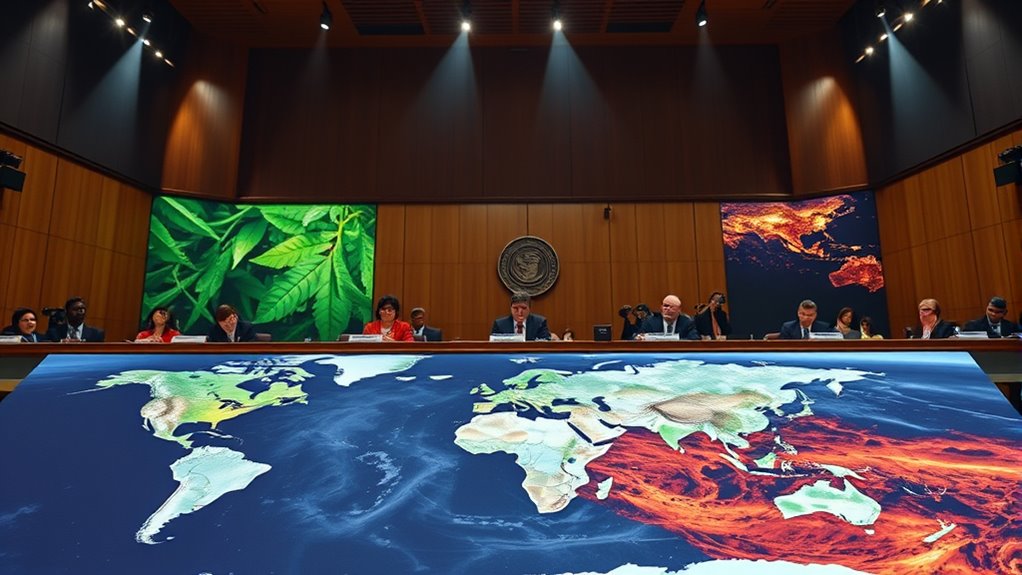In 2025, international courts are increasingly holding nations accountable for climate inaction, and you’ll see lawsuits demanding they meet their climate commitments. Countries face pressure for policies favoring fossil fuels, and courts are demanding transparency and stronger action. These legal battles are reshaping how governments respond to climate change, emphasizing responsibility over policy. If you want to understand how legal responsibility is shaping global climate efforts, the details will surprise you.
Key Takeaways
- Numerous nations are being sued for failing to meet international climate commitments under treaties like the Paris Accord.
- International courts are increasingly holding governments accountable for policies favoring fossil fuels despite climate science warnings.
- Legal actions demand transparency and enforce tangible emission reduction commitments from nations.
- Court rulings are compelling countries to modify climate policies and implement stricter environmental regulations.
- International legal mechanisms are expanding to enforce climate justice, with courts playing a pivotal role in holding nations accountable.

As climate change accelerates, litigation related to environmental responsibility has become more prominent in 2025. You may have noticed more courts, especially the international ones, holding governments and corporations accountable for their role in worsening the climate crisis. This surge in climate litigation reflects a growing recognition that addressing climate change isn’t just about policy—it’s about enforcing legal accountability for actions that contribute to global warming. Countries are now facing the international court system, not just for environmental neglect but for actively undermining efforts to curb emissions or dismissing scientific warnings. This legal trend underscores a shift where climate change is no longer seen solely as an environmental issue but as a matter of justice and responsibility.
You might find it surprising how many nations are now being challenged for their contributions to climate change. Some are accused of failing to meet international commitments, while others are questioned for policies that favor fossil fuels despite public awareness of their detrimental effects. These cases often involve complex legal arguments about the obligations states have under international agreements like the Paris Accord or human rights treaties. You should understand that governments are increasingly being held accountable for their inaction or inconsistent policies, making climate change a central issue in international legal debates. The courts are demanding transparency and tangible commitments, forcing nations to justify their climate strategies under the lens of legal accountability. Additionally, the role of international courts in adjudicating these disputes highlights the expanding scope of legal mechanisms available to enforce climate justice.
Moreover, corporations are not exempt from this shift. You might see more lawsuits targeting big oil, coal, and gas companies, accusing them of misinformation campaigns or delaying climate action. Many of these cases aim to establish that these corporations have a duty to prevent environmental harm and should be held responsible for their role in escalating climate change. These legal actions are setting important precedents, emphasizing that economic actors cannot ignore their environmental impact without facing consequences. This focus on legal accountability reflects a broader effort to ensure that climate change isn’t just a political or scientific issue but one where justice is served through the courts.
In 2025, the international court system is serving as a pivotal arena for climate justice. You can expect more rulings that compel nations and corporations to change policies, reduce emissions, and adhere to international standards. These legal actions signal a clear message: climate change is a matter of legal responsibility, and those who contribute to it must be prepared to face accountability. As the legal landscape evolves, it’s evident that climate change litigation will continue to shape international efforts, emphasizing that safeguarding the planet requires everyone to be answerable for their role in the crisis.
Frequently Asked Questions
Which Countries Are Most Likely to Face International Climate Lawsuits?
You should watch out for countries with high climate vulnerability and weak legal accountability, as they’re most likely to face international climate lawsuits. Nations heavily impacted by climate change, like small island states and developing countries, often seek legal action to hold bigger emitters accountable. Their vulnerability makes them prime targets for litigation, pushing the international community to address climate injustice and enforce legal accountability for climate damages.
How Does Climate Litigation Influence National Policy Changes?
Climate litigation drives you to prioritize climate adaptation and refine policy implementation. When nations face lawsuits, they’re compelled to strengthen environmental laws and take more decisive action on climate change. This legal pressure pushes you to adopt stricter regulations, invest in sustainable infrastructure, and guarantee policies effectively address climate risks. Ultimately, litigation acts as a catalyst, prompting governments to act more urgently and systematically on climate issues.
What Legal Precedents Exist for Climate-Related International Court Cases?
You’ll find that legal precedents for climate-related international court cases include the Urgenda case, which set a binding climate duty under Dutch law, and the Leghari case, where Pakistan challenged government inaction. Both establish that climate change falls within legal jurisdiction, and governments can be held accountable. These cases create a foundation, shape legal arguments, and set standards for future climate litigation worldwide.
Will Climate Litigation Lead to Financial Reparations or Sanctions?
Climate litigation can lead to financial reparations or sanctions, as courts hold nations legally accountable for environmental harm. You might see climate finance allocated to support affected communities or enforce sanctions against non-compliant countries. This legal accountability pressures governments to prioritize climate action and adhere to international commitments, ultimately shaping global efforts to address climate change while ensuring those responsible bear the financial consequences of their actions.
How Can Nations Strengthen Their Legal Defenses Against Climate Lawsuits?
Your nation can bolster its legal defenses by developing robust climate policy and proactive legal strategies. Focus on gathering compelling scientific evidence and aligning policies with international climate commitments. Strengthen diplomatic ties to build support and anticipate legal challenges. By staying ahead of climate litigation, you can prevent devastating consequences and showcase your commitment to global sustainability. Remember, a well-prepared legal framework is your shield against mounting climate lawsuits.
Conclusion
As nations stand on the brink of unprecedented legal battles, the outcome remains uncertain. Will the courts hold governments accountable or allow climate inaction to continue unchecked? The world watches closely, knowing that the decisions made in 2025 could shape the future in ways we can’t yet fully grasp. One thing is clear: the next move could change everything—if you’re paying attention, you might just see history in the making.










